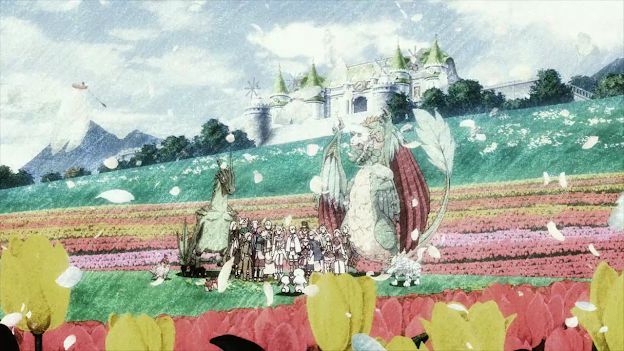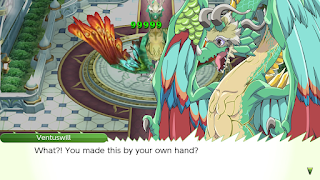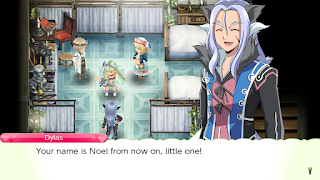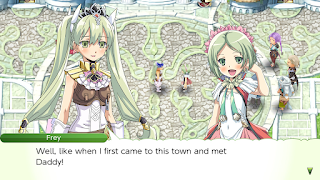While traveling by airship, Lest/Frey (the protagonist) is attacked by rogue soldiers. During the scuffle Lest/Frey falls from the airship, landing in the town of Selphia and loosing their memory in the fall. The goddess of Selphia, Ventuswill, mistakes them for a member of the royal family who was scheduled to arrive that day. The real prince shows up a few days later but allows Lest/Frey to continue carrying out royal duties in their stead: attracting tourists, mingling with the villagers, and gardening.
The narrative has a clear three part story arc with ending credits accompanying the conclusion of the first two arcs, but not the third. I managed to finish about one story arc every in-game year, but it is very much a move at your own pace kind of game. However, advancement of the plot will be essential to unlocking certain dungeons and items. The story technically concludes in the second arc with the (highlight to read) death of Venti, rendering everything you did in the first arc to save her irrelevant - which I was okay with. It had a nice message about accepting death and moving on.
The third story arc is basically post-game content, taking place almost entirely within a multi-level dungeon (Rune Prana) with deadly traps and a massive difficulty spike. There is less plot and character development than any of the town events, ending with the protagonist placing a runesphere on the ground to return home to find Venti back. No reunion scene with the townspeople, no ending credits sequence like the other two arcs... nothing. Hardly any of the villagers even acknowledge or react to Venti's return afterward. It just completely goes back on the previous arc's message of death acceptance by having the entire town go against Venti's wishes and resurrect her using the same unnatural methods as Ethelberd (the final boss). They went out of their way to create this "feel good" ending that deflates the narrative.
That said, it's extra. You never have to do it, but your prize is seeing Venti (a great character) every day again. Personally, I like to think of the dating/marriage aspects as the true third arc because it comes with a lot relationship building, new dialogue, events, and even a unique ending credits sequence. Going through the motions of dating someone and then having and raising a child together also felt like a good follow up to the second arc's message about accepting death as a facet of life and moving on.
Lest/Frey is an "Earthmate" - someone with a strong connection to nature; essentially a farmer. Your job as an Earthmate and false prince(ss) is to cultivate a farm, build relationships with the townsfolk, and undertake missions for Ventuswill. The game operates on a four month, 30-day calendar cycle, with the player free to decide what activities they engage in every day; limited only by the amount of in-game time and stamina (RP) the farmer has to spend on physical labors.
Farming:
The player is given an expandable field in Selphia with expandable barns that can be filled with monsters who will help tend to the crops, freeing up more of the player's time. There are also fields outside of town that are eternally stuck in one season, so the player can efficiently grow crops outside of whatever season Selphia is currently experiencing. An interesting aspect of Rune Factory 4 is how any crop can technically be grown in any season, even winter, but will not grow as efficiently outside of its designated season. It doesn't matter if you partake in the farming aspects or not, but it generates a lot of revenue and resources.
Seasonal fields have to be maintained by hand.
The game has a surprisingly robust farming system that allows the player to till corn, clover, or weeds into the soil to improve it. The player can use chemicals they make themselves to enhance the soil, speed growth, increase size, or make the plants more resilient to typhoons and snowstorms. Plant quality can be improved through generations of seed collecting and selective breeding. Giant crops can also be grown that are used to tame powerful boss monsters.
Left: Clearing land. Right: Additives are used to protect crops from foul weather.
Left: Any crop can be grown in any season. Right: The same crop planted on a 2x2 grid can become a giant crop.
I did most of the fieldwork myself early in the game because it improves your stats and max RP by leveling certain skills, including ones you wouldn't think get leveled. Monsters can do the work for you, but when monsters work a field they lose a percentage of their HP each day. Eventually they will become too tired to work and stop. Giving them potions/food or rotating beasts every few days will keep them working.
Dungeon Crawling/Taming:
Most of the dungeons are tied to the main storyline, but there are a few secret dungeons hidden around the game world. One of these secret areas is the Demon's Den, which is only accessible during the first week of any season. You can even grow a dungeon on your farm that drops Sword or Shield Seeds as loot. These can then be used to grow Plant Swords or Plant Shields respectively. The stats on these items are completely randomized so its possible to get a Plant Sword with post-game stats. Post-game content also includes the Sharance Maze (purchased using in-game points), which has a 300+ level boss.
Nearly every monster in a dungeon, including the boss ones, can be tamed by the player using friendly pats and food. Tamed beasts are then kept in barns on the Selphia farm where they assist with farm chores. As an added bonus they drop loot periodically that can be used in crafting or cooking. They can even be taken along as companions or ridden, and end up being very useful in dungeons given how strong some of them can be.
Monsters can be tamed and ridden, including the bosses.
Crafting/Cooking:
The player can craft almost anything: farm tools, weapons, armor, accessories, or medicine. Like every skill in the game, the crafting level increases through use and determines what new recipes are unlocked. Cooking was one of the more useful skills because it served the dual purpose of producing medicine as well as food, a favorite gift among the villagers - they know if you cooked something yourself or not. Turning fish or crops into a dish before shipping them also rakes in some easy cash.
Make your own chemicals.
Create and upgrade your own tools.
Orders:
As a false prince(ss) the player runs the town using "Orders", which use "Prince(ss) Points" accrued through daily requests received in the mailbox. Points can also be gained from town events that trigger at random or from annual festivals. Orders allow the player to build new shops, expand the farm or storage places, throw festivals, attract tourists, push away typhoons, and more.
The power to summon or chase away typhoons.
Social:
The player's relationship status with each person in Selphia is tracked using Love Points (LP). LP is increased by talking to people, handing out liked/loved gifts, or winning festivals. As LP increases it will trigger new unique dialogue or prompt a villager to offer gifts to the player in return or wave as they pass by. There is also the option to date, marry, and raise a family with any of the bachelors or bachelorettes (hetero only). Starting around LP level 7 the player can ask the townsfolk to be their boy/girlfriend, however, there's only a small chance they'll say yes. Around LP level 9 they are more likely to agree. I was pleasantly surprised by just how much content and depth Rune Factory 4 gave to something that is usually tacked on to games as a gimmick. The sheer number and quality of the character events was surprising, especially because they expanded on the characters by revealing secrets and insecurities they normally wouldn't show to a friend but are more open to letting a lover in on; like how Arthur's love of glasses and lack of trust in others is the result of his mother ignoring and eventually abandoning him. Or Margaret knowing she will outlive almost everyone in town and struggling to cope with that knowledge.
Dating also comes with unique events and dialogue, particularly from the Selphia residents who take notice of the relationship and react to it. After 3 dates and a prerequisite event, marriage can be proposed. 19+ game days into the marriage, the player's spouse may ask about children. If the player chooses to have to a child, there will be several additional short scenes about them and their spouse expecting and then raising Noel/Luna (the child) after a five year time skip. The child isn't throwaway either. Noel/Luna gets their own town events, birthday parties, and can even be taken into battle.
Befriend the townsfolk.
Now for a mini-complaint: Most of the marriage candidates appear to be really young (18+), which is fairly common in games from Japan. However, I was really creeped out by Amber and Kiel as marriage candidates because they appear and act like really young children (10 to 13ish). Amber especially seemed to lack a basic understanding of what dating entails, and what she and her partner get/want out of the relationship. It has to be explained to her, unlike with Kiel who is a little more aware. Regardless, it still feels like pedophile territory, and is made worse by the fact the player can have a child with them. If I had to guess as to why Kiel and Amber were selected as marriage candidates over someone more age appropriate, like Illuminata, I would assume it was to appeal to younger players. The game's rating was originally an E10+ but was later changed to a T. I honestly have no problem with Kiel and Amber as characters within the game. I just take issue with them as minors in a sexual relationship.
There is so much content packed into Rune Factory 4 Special that'll keep you busy well after the game ends. You're free to move at your pace and every activity is optional, but because skills are so interconnected its near impossible to not engage with everything. Trying to triggering certain random events, especially for character progression, can be a little irritating but the writing is superb for a game of this type. An easy recommendation.
First posted to videogamegeek.com on November 26, 2020.
Related Reviews:































No comments:
Post a Comment